As Garry W. Jenkins, Bates College’s ninth president, received the figurative, and literal, keys to Bates’ future as its new leader today, he did so with gratitude, compassion, and determination.
Before the roughly 1,200 guests in Merrill Gymnasium, Jenkins promised he would lead Bates “with humility and transparency, with tenacity and enthusiasm, and, of course, with ardor and devotion.”
Offering four cornerstones that “will guide our work and propel us forward” and asking the Bates community to “embrace the challenges that await us,” Jenkins emphasized how now more than ever Bates needs to promote teamwork, to remove barriers to students, to become more inclusive, and to cultivate and prepare leaders for tomorrow’s challenges.
By doing so, he said, Bates will become stronger while serving society and democracy. “They rise together.”
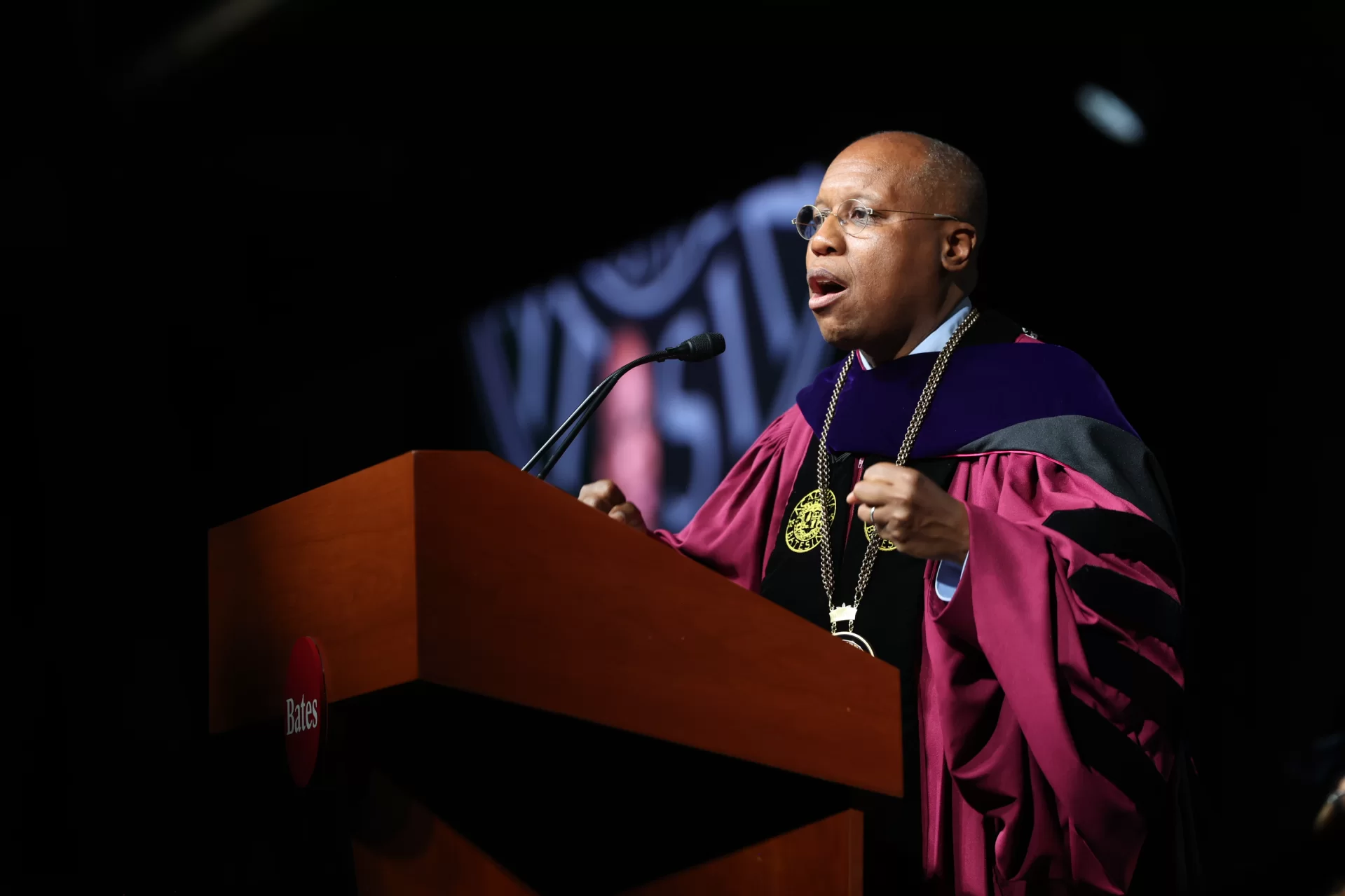
Jenkins, who was appointed the college’s first Black president on Feb. 27, 2023, and began his tenure on July 1 of last year, was formally installed in a transformed Merrill Gymnasium adorned in elegant, dark drapery.
The proceedings played out on a brilliantly illuminated stage, greenery along the perimeter and the Bates seal above it all. As the academic procession arrived and took its place, the Bates College Orchestra performed Festive Overture, composed in 1944 by William Grant Still, a 1954 honorary degree recipient from Bates.
“I am moved beyond words by the warm welcome that you have offered me — here on this stage, on this day, but even from the very first moments that my joining this community became even a remote possibility,” said Jenkins. “This place — our college — is a place of warmth and welcome, and you have made that abundantly and beautifully clear.”
Watch the complete inauguration of Garry W. Jenkins as Bates’ ninth president below. (Note: If the video begins with the inauguration slideshow, please advance the video to minute 29 for the beginning of the processional.)
Before the presentation of the symbols of the college and Jenkins’ own address, several speakers from the Bates community and beyond offered traditional welcomes to the new president. Perhaps the most heartfelt one came from two student leaders of the Bates Student Government. Dhruv Chandra ’25 of Kolkata, India, and Rebecca Anderson ’24 of Boone, N.C.
“There was electricity in Alumni Gym on that March afternoon when you were introduced to us. And when you spoke to us that day, we were inspired,” said Chandra.
“You have signaled repeatedly that we all belong here — all have a place here — all have a contribution to make and a mark to leave on this college that we all care for so deeply,” Anderson said. “You have encouraged us all to be leaders — to be part of the solution. And your warmth and dedication inspire us to do just that.”
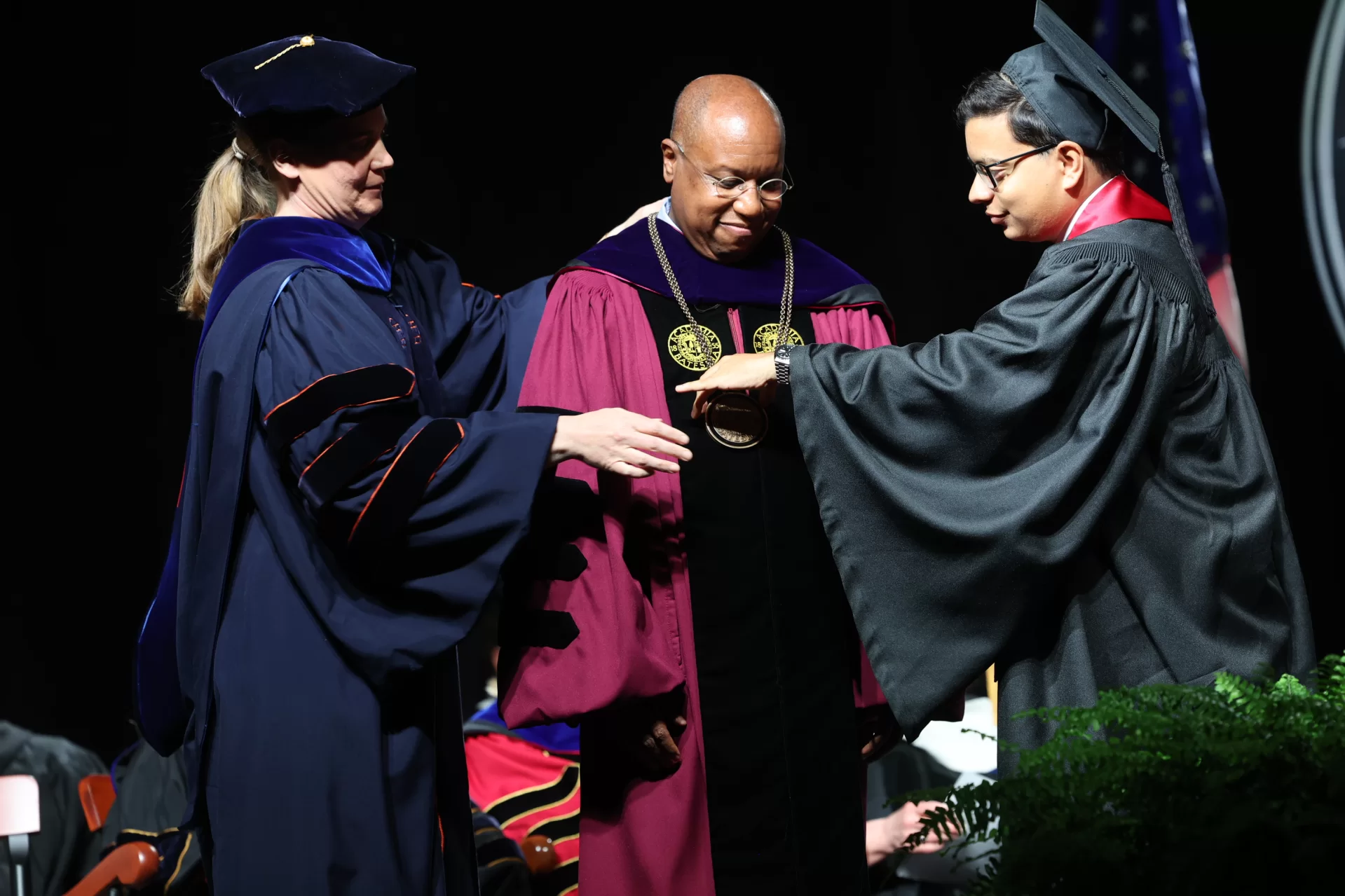
Two speakers who know Jenkins well offered personal insights and praise of the new Bates leader.
“You could not have made a better choice for an institution so steeped in history so deep in reputation and so vibrant in its momentum,” said Joan Gabel, offering the traditional introduction of the new president. Currently chancellor of the University of Pittsburgh, Gabel was president of the University of Minnesota when Jenkins was dean of the university’s law school.
“He has a unique ability to lead while creating spaces for others to find their best self. I can’t imagine a better president for an institution whose motto translates to, ‘with ardor and devotion.’”
“Congratulations, Bates College, on being on the Jenkins journey!”
Wendy Raymond, president and professor of biology at Haverford College
Wendy Raymond is president and professor of biology at Haverford College, Jenkins’ undergraduate alma mater. She offered the traditional welcome on behalf of the academy.
“Through Bates and all that the Bates community represents, Garry’s ethical and impactful leadership, rooted in the liberal arts and an enduring set of values and humane capacities, will know no limits. Congratulations, Bates College, on being on the Jenkins journey!”
Following the welcomes came the presentation of the symbols of the Bates presidency.
Associate Professor of Mathematics Katy Ott and Sabeeh Khan ’24, an economics major from Islamabad, Pakistan, presented the Presidential Medallion, representing the authority vested in the president by the Board of Trustees.
The Record Book, containing the minutes of the Board of Trustees’ first meeting on April 5, 1855, and symbolizing the longevity and historical legacy of Bates College, was presented by Andrea Bueschel ’90, a Bates trustee who as a Bates senior in 1990 offered student greetings to President Donald Harward, the college’s sixth president, at his installation.
The keys of the office, representing the passing down of authority through the college’s presidential lineage, were presented by Susan Nattress, who manages the Bates electronic access system — “keys” of today.
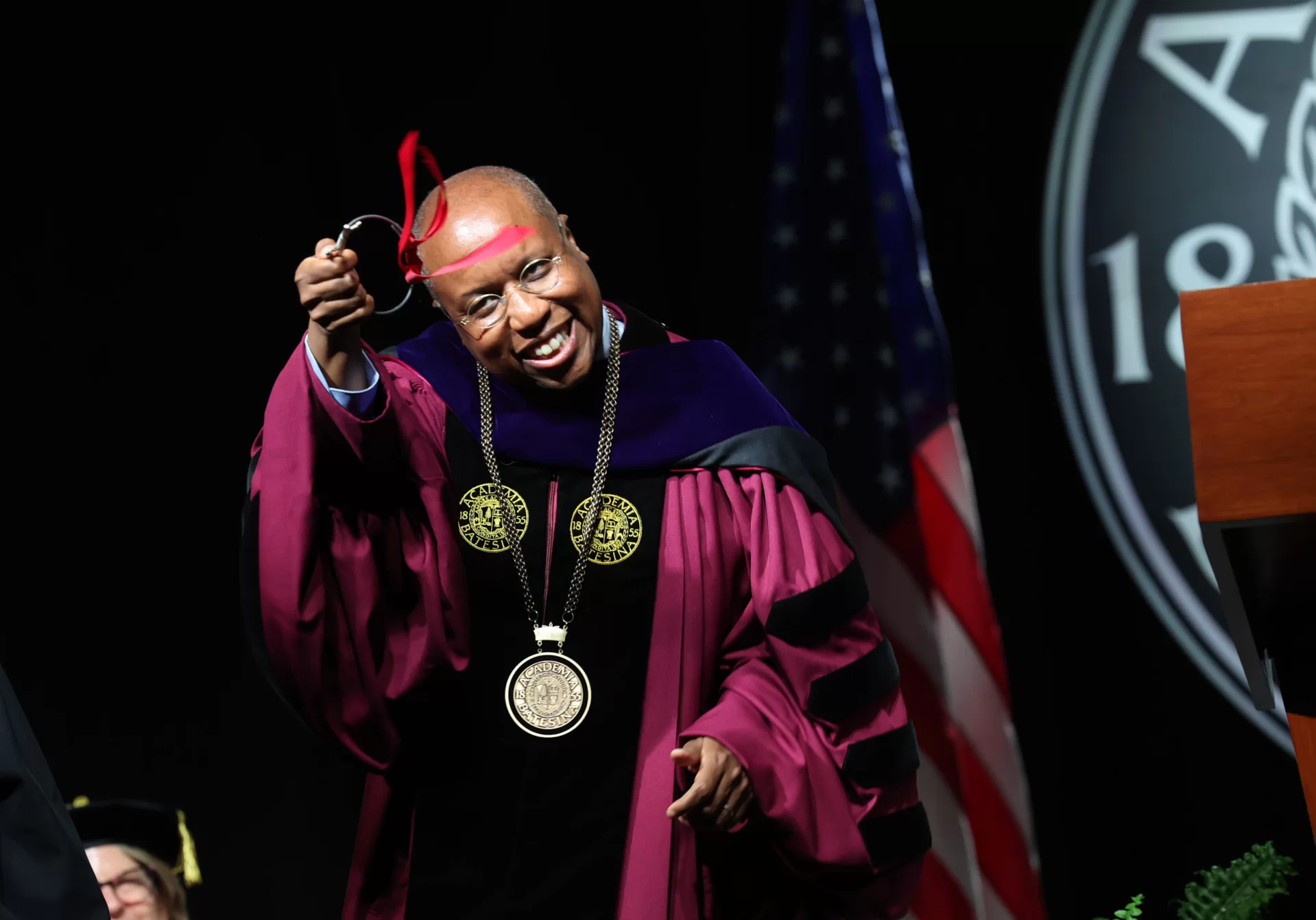
With a winning trifecta of symbols presented, it was time to formally introduce the new president, which Greg Ehret ’91, chair of the Board of Trustees and host of the ceremony, did with a promise of solidarity and support.
“From the Bates College Board of Trustees, from faculty, staff, students, alumni, and families, and from the many friends and champions of this great college: We offer to you our warm welcome, our dedicated labor, and our enthusiastic support. It is now my great honor to present to you the ninth president of Bates College, Garry W. Jenkins.” A 45-second standing ovation full of cheers followed.
The installation took place six months after its originally planned October 2023 date, postponed due to the mass shooting in Lewiston on Oct. 25. As he welcomed the audience, Ehret asked for a moment of silence “in honor of the friends and neighbors we lost.”
Jenkins also spoke about Oct. 25. “There was tragedy in the events of late October. But there was also grace and beauty in the response. I know that this community will hold both of these truths as we continue to move forward into the future,” Jenkins said.
The sentiments resonated with the audience, especially with Lewiston mayor Carl Sheline, who, in offering the city’s welcome a few minutes before, said, “We were grateful for your partnership and outreach to our community during and after the tragic events of October 25. Amidst those dark times, you emphasized the strength of our collective support network, reminding us that our most valuable resource is our connections with each other.”
From there, Jenkins spent a few moments thanking many in attendance: Maine Gov. Janet Mills, the Board of Trustees, especially the search committee co-chairs, Bueschel and Greg Ehret ’91, the delegates who represented more than five dozen institutions, the former Bates presidents, his family, and many others.
He thanked his brother, Chris Jenkins, his husband, Jon Lee — whom he lovingly dubbed Bates “first friend,” and his parents, Garry and Leslie Jenkins, who instilled in him “a belief in the power of education, the importance of thinking for yourself, and the value of building and supporting community, and community around you.”
“This wouldn’t be possible without them,” Jenkins said, his voice breaking.
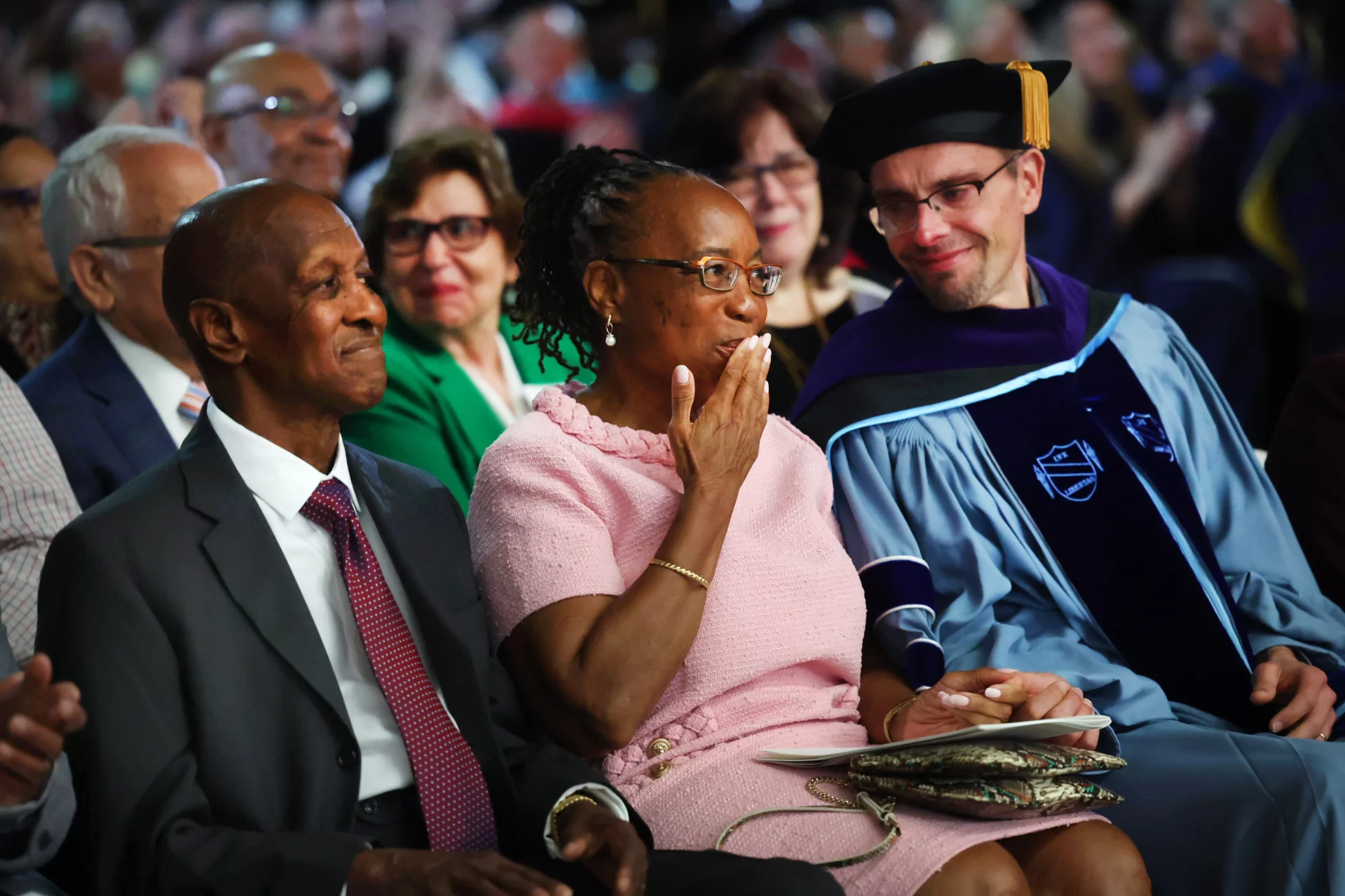
Jenkins chose “Rising Together” as the theme for his inaugural address because “I believe deeply in the power of collaboration and teamwork; because I believe that when people and/or institutions join forces, opportunities multiply. Because I believe that win-wins are better and more lasting than just wins; and because I believe that we go further and are stronger when we lift one another up,” he said.
Jenkins first spoke of the “improbable” historic firsts that exemplify Bates’ long-standing commitment to equality.
“I am glad that today, with places like Bates in the world, and with people like those who make up this community, no dream is too big.”
President Garry W. Jenkins
Bates, he said, “was a radical notion from its very founding in 1855, six years before the Civil War, founded with a distinct vision of higher education: women and men, people of all races, learning together. Steadfast in the idea of what it meant to be fully human. But an outlier.”
It is a tradition of equity and inclusion that has continued, Jenkins assured. “In Bates I see the lived commitment to equity, to access, to belonging.”
Jenkins said that he recalled when “not too long ago, asking, would our nation’s most selective colleges ever be open to a Black president? To an openly gay president? Would that be possible? Was that a dream too big? I am glad that today, with places like Bates in the world, and with people like those who make up this community, no dream is too big.” A robust round of applause followed.
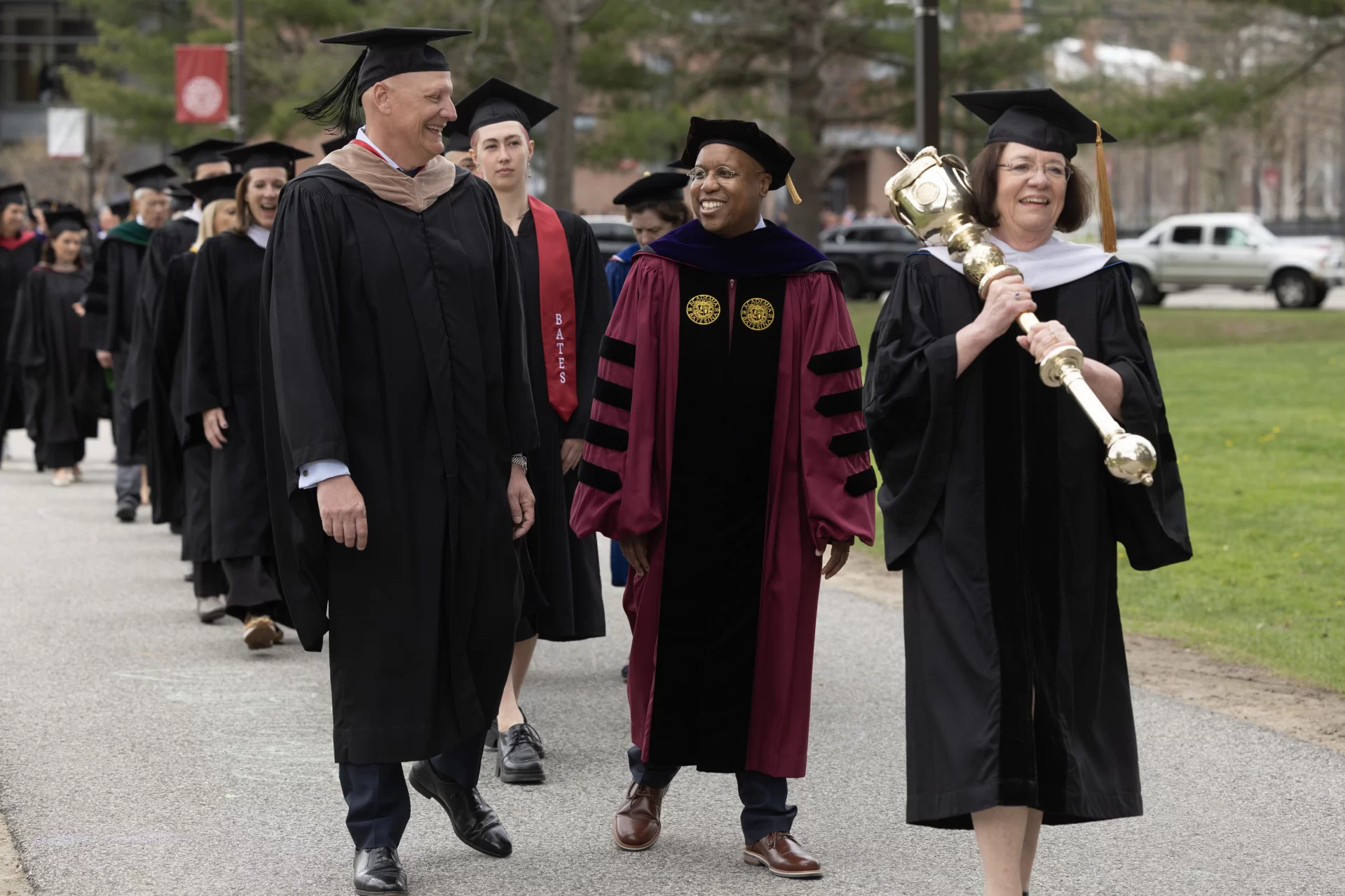
Today, Jenkins said, Bates remains a place where there is room for everyone regardless of race, ethnicity, religion, sexual orientation, gender identity, political or ideological viewpoint, or background. “It’s all of us at that table — we thrive, we rise together,” he said.
Then Jenkins indulged in a bit of bragging, listing Bates’ impressive track record for sending students to top graduate programs, leading medical schools and law schools, and its rich history of fellowships, which includes the past 12 years as a Fulbright top producer.
“Am I bragging? If so, I brag for us all!” Jenkins said. “There’s so much to be proud of. But how’s we do it? We do it together!”
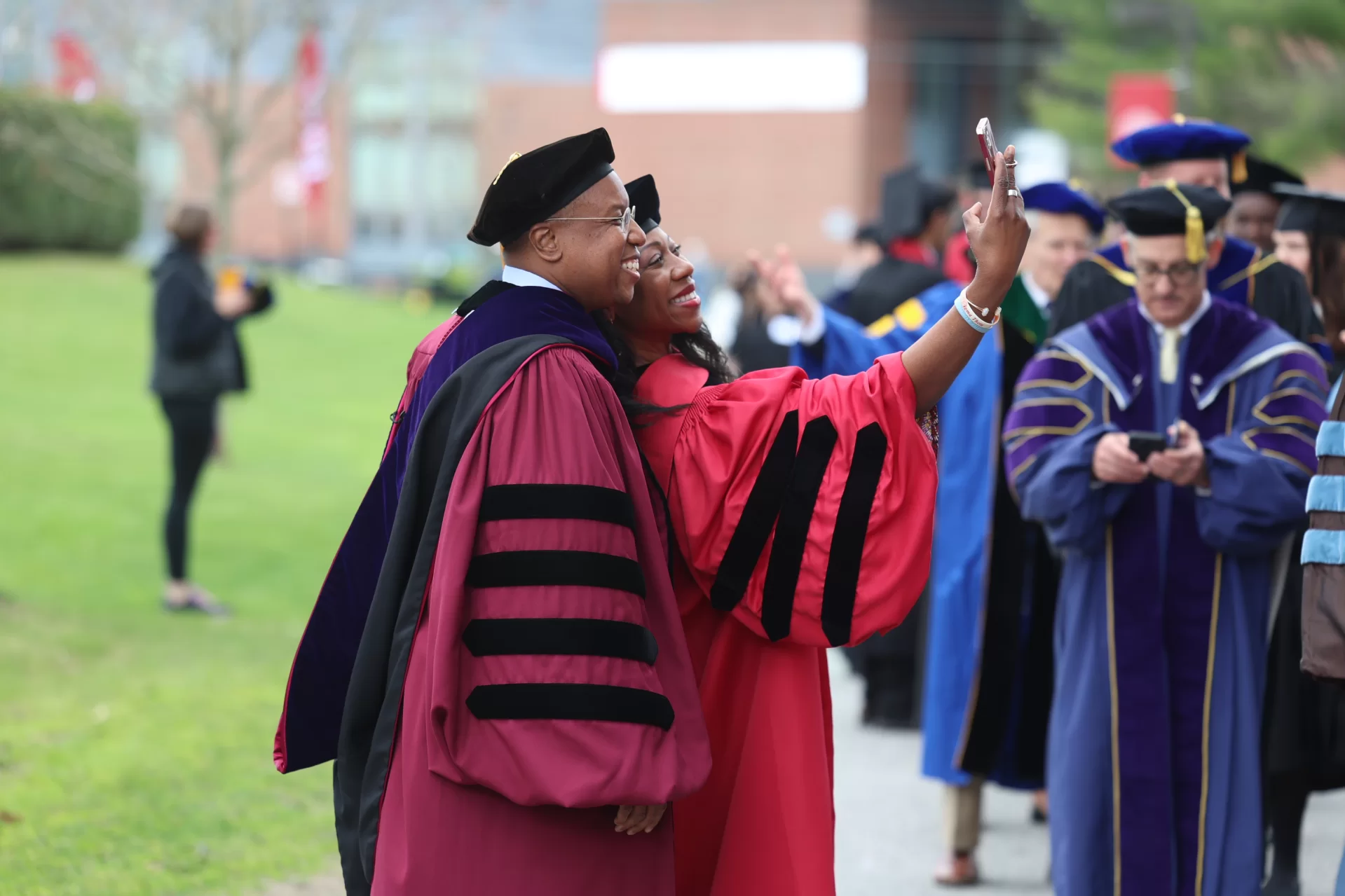
Jenkins then mapped out four key areas where Bates can better cultivate tomorrow’s leaders, areas he called “the four cornerstones.”
“The task before us is to continue to evolve and raise our sights. To bolster the relationships that are at the core of our success as an institution, and to do even more to cultivate and prepare humane leaders of the next generation. To protect and enrich the gift that is Bates for the future,” Jenkins said.
The four areas he said will guide Bates in the future are:
Innovation
Bates needs to draw on the innovation and flexibility that has made it a model in such areas as inclusive excellence in education, environmental stewardship, and in integrating theory and practice into its courses, Jenkins said.
“As we move into our next chapter, we will need to draw on that innovation and flexibility to fully take advantage of our personal scale, to heighten even further the power of collaboration, meeting changing student interests and enrollment needs,” he explained.
Opportunity
Opportunity means access, Jenkins said, and Bates seeks to educate “the most promising students from a wide range of backgrounds.”
“We want Bates to be a place of opportunity for all,” he said. “And we will continue to open the doors of opportunity wider to highly talented students from all backgrounds, geographies, and family incomes.”
Leadership and Well-being
“We need to attend to the entire student experience, especially when it comes to leadership development and supporting well-being,” said Jenkins, who, as a law school professor and dean, became a nationally respected authority in leadership development, among other areas.
“In the years ahead, we must focus on thoughtfully and intentionally preparing our students to lead and serve for the benefit of industry, disciplines, organizations, and communities,” he said.
Civic engagement
“The work of equipping emerging adults for the responsibilities of citizenship with an understanding and development of the skills of civil discourse, constructive dialogue, active listening, respectful debate, openness to different viewpoints, negotiation, and collective problem solving has never felt more pressing.”
Bates students also must model civic engagement, including through the outstanding work of the Harward Center for Community Partnerships, Jenkins said. “We shall broaden the college’s role as an advocate, as a convener, and as a key institutional partner for the development and quality of life for our region,” he said, prompting a round of applause.
Growth in these areas will require further growth of the Bates endowment and “striving for the financial standing and security that allows us to fulfill our highest aspirations,” but Jenkins promised it would reap results.
“In so doing, we will help make it so that Bates is even stronger and more distinguished at its 175th anniversary, a mere six years away, and also its 200th, and its 300th,” he said.
Before he closed, Jenkins circled back to the reminder that we live in troubled times: “the world is in conflict, in need. Violence, extremism, insularity, and hateful rhetoric are all-to present. Higher education is under attack, vulnerable to government interference.”
He vowed: Bates will address all of these challenges and more — in one united effort. “We know this because of what Bates was, what Bates is, and what Bates promises it can be,” Jenkins said.
“What we can do is accept — or grab — the baton that is passed to us. Embrace the work and challenges that await us. Run as fast and as hard as we can during our leg of the race.”
President Garry W. Jenkins
Jenkins closed with a charge to the Bates community, likening their role to that of a runner in a hotly contested relay race. “Our predecessors…have carried us far, but they did not complete the journey. In any perpetual institution like a great college or university, you never do.
“But what we can do is accept, or grab, the baton that is passed to us. Embrace the work, the challenges that await us. Run as fast and as hard as we can during our leg of the race” in order to renew and strengthen Bates.
“That is our task. That is our privilege.”


